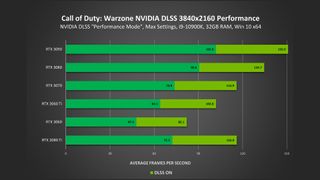Nvidia GeForce RTX GPUs are giving Call Of Duty games a DLSS boost
Can't blame your performance on framerate now

Call of Duty: Warzone has now adopted the use of Nvidia's DLSS technology in its latest patch update for players with compatible hardware, having announced plans to use the feature during the Game On live stream feature back in January 2021.
DLSS stands for 'Deep Learning Super Sampling', which essentially upscales the resolution, giving you much faster frame-rates than running natively in 4K. This feature is also the saving grace for fans of raytracing, as DLSS can make up for the loss of frames when enabling demanding RTX graphics in games.
We're seeing a lot of games getting on board with DLSS, and for good reason given how successful it's been. The good news for gamers is that more are coming, and if you’re interested, we’ve compiled a roundup of the best DLSS-powered games which is well worth a look.
Call of Duty: Warzone with NVIDIA DLSS is AVAILABLE NOW!Turn on DLSS for up to 70% faster performance. 💪 #RTXOn Read more ➡️ https://t.co/MlaXTK7ews pic.twitter.com/2vn9TKykc9April 22, 2021
- These are the best processors
- And the best graphics cards out there right now
- Check out the top PC components
You should absolutely enable this feature

The performance of DLSS can vary from title to title, but in the case of Call Of Duty: Warzone, you can allegedly expect up to a 70% improvement on your framerate, which as any regular players of competitive first-person shooters will tell you, could give you the edge during a match.
This DLSS update is being added to other CoD games too, so you can also start boosting your performance in the Call of Duty: Modern Warfare campaign and Blacks Ops Cold War Zombies – though Nvidia hasn't yet published any benchmarks for those titles.
If you have any GeForce graphics card from the 20 series and up (identified with an "RTX" in the GPU name) then the DLSS boost will be available to you. VideoCardz reports that a few users have so far experienced artifacts and ghosting after enabling the feature, but this is early days and that is likely to be smoothed out.
- Check out all the best gaming monitors
Get daily insight, inspiration and deals in your inbox
Get the hottest deals available in your inbox plus news, reviews, opinion, analysis and more from the TechRadar team.
Jess is a former TechRadar Computing writer, where she covered all aspects of Mac and PC hardware, including PC gaming and peripherals. She has been interviewed as an industry expert for the BBC, and while her educational background was in prosthetics and model-making, her true love is in tech and she has built numerous desktop computers over the last 10 years for gaming and content creation. Jess is now a journalist at The Verge.

